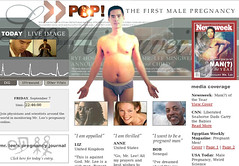In my search on information literacy, I have come across some interesting links:
This site lists anonymous wikipedia edits by IP or organization.
Eye to I: Visual Literacy Meets Information Literacy
The home of the virtual poster sessions that were offered in conjunction with the ACRL Instruction Section/Arts Section program at ALA 2007 in Washington D.C.
I wanted to make this session but couldn’t. I’m interested in the intersection of visual and information literacy- I’ve blogged about visual literacy in the past, and spent most of my freshman year in college in a bloated (and required) visual literacy course. My understanding of visual literacy has changed quite a bit since then.
 RYT Hospital-Dwayne Medical Center
RYT Hospital-Dwayne Medical Center
Home of the infamous Male Pregnancy page. When I was a junior, someone brought a printout of this page to a sociology class I was in. The teacher tried to argue against the concept, said that it was impossible, and just because the site didn’t obviously say it was false didn’t mean it was true. I found the site on snopes.com a few weeks later, and wished I had spoken up.
The student wasn’t convinced. He probably believes men can have babies to this day.
Digital Campus Episode 01 – Wikipedia: Friend or Foe?
In the first episode of this fantastic podcast, professor Mills Kelly tells about an assignment he gives based on wikipedia- he has the students make substantial edits to a wikipedia page, and then track those changes as the semester goes on.
Pew Internet & American Life Project report on Search Engine Users
This report from 1995 polled 2,200 adults 18 and older about their internet searching habits. The report and the survey results are worth a read.
I found this response in the survey especially disturbing: – 49% of users that used search engines said they would continue using a search engine if they “learned that a search engine was accepting fees from websites, and was listing those websites without making it clear that they were PAID or SPONSORED.”
